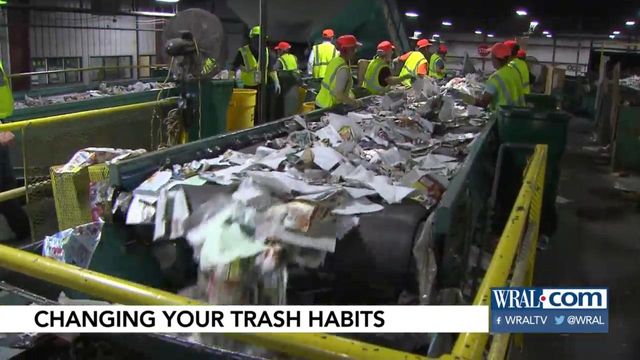NC's growing trash problem poses challenge
North Carolina residents generate almost 12 million tons of trash every year. And as the state's population grows, concerns are also mounting in the Triangle over where to discard all of that trash.
Posted — UpdatedNorth Carolina residents generate almost 12 million tons of trash every year. As the state's population grows, concerns are also mounting in the Triangle over where to discard all of that garbage.
Every two months, local residents throw away enough trash to fill dumpsters lining the entire route of Interstate 40 in North Carolina, according to statistics compiled by local and state regulators. Keeping recyclables out of that trash mix will help reduce the amount of garbage collected in landfills. But solving the state's trash troubles goes beyond recycling.
"That's a lot of waste," said John Roberson, the Solid Waste director for Wake County. "You wrap your mind around it, (and) it's a lot."
Recycling can help extend the life of landfills, he said.
"The more trash we bring, the less we recycle," Roberson said. "The less we recycle, the less life we have in (our) landfill."
The South Wake County Landfill, which generated some controversy when it was built in 2008, will likely be the last one in Wake County. That's because it's currently estimated to reach capacity in about 25 years.
According to the county's data, the average person in Wake generates just over one ton of garbage a year. That is down from 25 years ago, but a comparison to other counties shows that local residents can reduce that garbage rate further. The county generates more trash per person than people in Durham, Granville, Franklin, Nash, Johnston, Harnett and Chatham counties.
Said Roberson: "We're doing our best to deal with these things."
Wake County's five convenience centers help. The facilities opened as part of the county's strategy to help reduce the illegal dumping that occurs around the county. The centers accept most trash items that are brought in, officials say. Most of the trash items are recycled.
Roberson said there are simple changes that residents can do themselves can improve efficiency, save money and prolong the life of the county's dump.
- Don't bag recyclables. County officials say residents should not put their recyclables in plastic bags. "We can't fault people for what they're trying to do, which is recycle. But the problem is we're trying to get the word out is we need to recycle better. County officials say the plastic bags that are used to collect recyclables jam the sorting equipment at the county recycling center. So, anything placed in bags will not be recycled. Said Roberson: "So, they just make the policy that, if it gets to them and it's bagged, it goes in the trash, and that's unfortunate." When workers don't know what's in the bag, that increases the chances that the items will be placed in the dump and not recycled. "Not knowing what's in that bag, especially if it's a dark bag, could be something inappropriate for that facility (or) could be dangerous." County officials said about 10 percent of the recyclables collected in Wake County ends up in the landfill because it's left in plastic bags.
- Hang on to mattresses a little longer. "They cause operation problems and also cause long-term capacity problems." County officials say about 80 mattresses end up at the county's landfill a day. The discarded items are big, bulky and don't break down. "Once it comes to the landfill, because of the way they spring back, they all rise to the top of the landfill." John Rezendes, who lives near Fuquay-Varina, brought a mattress recently to the South Wake Landfill after using it for five years. He said he wishes there was an easier way for residents to recycle used mattresses. "It's ridiculous how difficult it is to pull a mattress apart," Rezendes said. County officials said they hope to one day get a mattress recycling facility. "If you hold on to your mattress a couple more years, that might be possible" for them to be taken to the new facility, Roberson said.
- Dispose of electronics properly. Wake County's convenience centers all take electronics, but the costs are rising, and officials are finding that it's getting harder to cover the cost. Under state law, computers and televisions must be recycled. Tubes in older televisions are no longer made but they are expected to clog recycle centers for at least another seven years. "It's costly to separate the materials," Roberson said. "It's costly to repackage the leaded glass." The convenience centers will take anything with a cord, so residents shouldn't throw away an old blender or can opener in the trash because they will end up in the landfill. The recycling efforts prolong the life of a landfill, but they also help the county cover solid waste costs. "With most other electronics, we either get some value or there's minimal cost, so it's not a big issue for us."
- Return plastic bags. The bags are not just a nuisance in recycling, but they pose special challenges because they don't decompose. The small plastic grocery store bags pose the biggest problem because they don't break down and because a team of people gets paid to collect the bags three to four days a week. Officials said that 90 percent of what those collectors pick up are the plastic bags. "Don't put them in the landfill," Roberson said. "There's an easy place to recycle them, and even grocery stores offer a recycling program, so take them back to the grocery store."
• Credits
Copyright 2024 by Capitol Broadcasting Company. All rights reserved. This material may not be published, broadcast, rewritten or redistributed.






